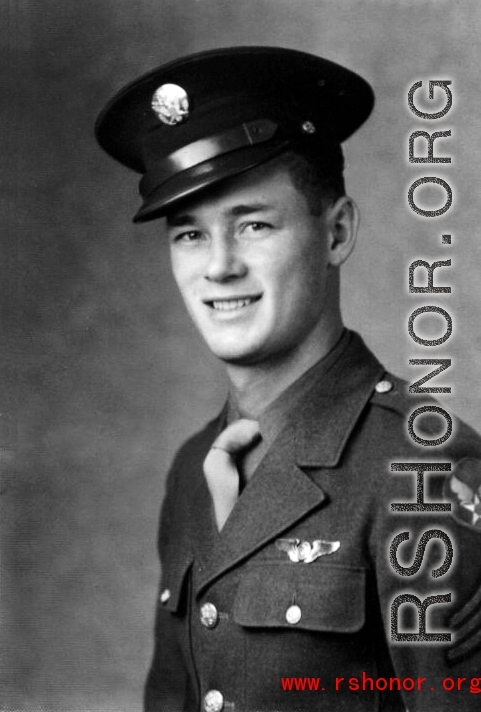A Wealth of Life Experience
Francis E. Strotman, oldest son of five siblings, grew up on farms in east central Nebraska. His limited formal education ended in the eighth grade when his father became ill and Francis had to shoulder the family’s farming responsibilities. However, he gained a wealth of life experience, the kind of practical knowledge a man used in doing whatever needed to be done—like so many people during his era.
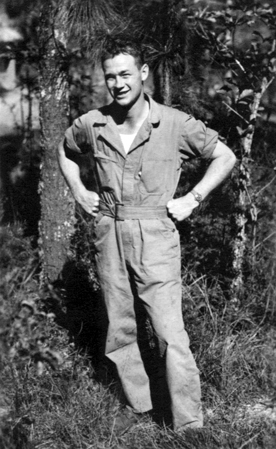
Francis was sharp, with natural mechanical talent, a talent honed while using and repairing the farm’s planters, harvesters, alfalfa mowers, and wind driven water pumps, as well as the usual trucks and cars. Most everyone, at least in the rural areas, tended to maintain their own equipment, and he was no exception, working daily on practical solutions to practical problems. And in addition to this, he could still care for horses and harness, and without difficulty use them for plowing or otherwise working the fields.
His mathematics, although not learned in the classroom, were equally strong—he could calculate the amount of seed or shingles needed for a given area, determine the correct slope of a roof to shed water or snow, and estimate the quantity of water to irrigate a certain field and the time required to deliver it through different size pipes. This knowledge within him was built in confidence, tried and tested over time. It was knowledge that he could apply himself, without needing someone to direct him.
He never dreamed that all these American hands-on skills—and his ability to think on his own—would be put to use in a great war.
But war did break out, and at a relatively old 25 years of age, Francis Strotman decided to enlist, even though he was exempt from the draft and enlistment meant leaving his wife for an unknown period of time. He just felt he had to do something more direct to assist in ending the war.
In February 1943 he took his first train ride, to Miami Beach for Basic Training, then to Amarillo, TX for Aircraft and Engines School, and Flight Engineer training. Next he was sent to Las Vegas for gunnery school, then to Greenville, North Carolina, for crew training. In a few months he experienced more than he had in all of his previous life, and for the first time traveled more than 85 miles from where he had been born.
During training he drew on his rich life experiences, leveraging what he already knew, while daily gaining completely new knowledge of advanced aircraft and arcane military ways. However, not everything translated across from his prior life, and he certainly had to study and sweat at times in order to get it all down. When it came to his duties he felt a high level of responsibility, and he paid close attention to detail.
He remained at Greenville for several weeks tasked with ferrying and flight testing aircraft and teamed with pilot 2Lt Arthur Armstrong. Now called "Ed", he readily agreed to stay partnered with "his" pilot when "Art" decided to press for an overseas assignment. Within days Lt. Armstrong’s request for reassignment was approved.
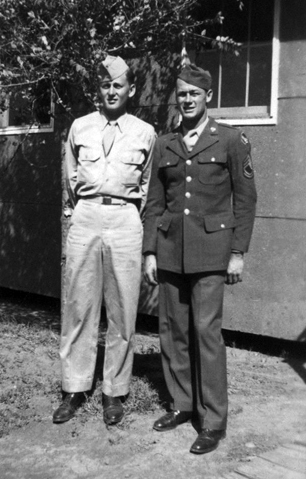
On the 15th of April 1944, five men came together as a crew—a crew that expected to fly together virtually all the way to war, during missions, and back to the US as a team:
Bomber Navigator-–Flight Officer[1] Frederick J.Bradley,
Engineer-Gunner - Sgt. Francis E. Strotman
Radio- Gunner - S/Sgt Robert P. Hinds
Armorer-Gunner -Sgt. Alphonse I. Lodoveco
This crew, with a brand new B-25H medium bomber, departed Morrison Field, Florida on May 6, 1944, along with four other planes and crews. After takeoff their orders were opened and they learned they were head for the China-Burma-India theater by way of Puerto Rico, Brazil, Ascension Island, Gold Coast, Libya, Arabia, Karachi, and Assam. Taking nearly three weeks to reach India, Armstrong’s crew was then delayed a few more days so they could act as 'pathfinder'—leading eight P-51 fighters across ‘the Hump’ from Kurmitola to Kunming, China. Upon arrival the men were assigned to the 491st Bombardment Squadron, reaching Yangkai, China, on June 7, 1944.
Soon they were involved in combat operations, attacking Japanese shipping in the South China Sea as well as attempting to stem the tide of a Japanese offensive which threatened the very airfields from which they launched. Almost immediately they learned that as a ‘replacement crew’ the men were not always assigned as a complete crew for missions, but rather individually as a matter of who was available compared to the needed skills for a given mission. So, on most missions they were each teamed with men whose skills might be unknown to them. Nonetheless the men accepted the situation and did their best to "get this war over with and go home."
During his free time "Ed" Strotman would visit the Chinese farms near the air bases. Although he had difficulty understanding the culture, which was seemingly so different from his own, he easily related to the Chinese farmers. Like them he had performed farm work without help of powered machinery, and had planted, tended and harvested crops by hand, as well as with assistance from horses. He appreciated the attitude and work ethic of the Chinese people, so much like his friends and family ‘back home’. His family strongly believes that Francis gained some sense of comfort and stress relief from his visits with the Chinese farmers.
While in China, "Ed" flew 31 combat missions, many from Kweilin [Guilin] and Luichow [Liuzhou], in Guangxi province. The missions ranged over a large area of China, Indochina, and the sea, and took no small amount of courage to carry out, especially as other crews—men who everyone knew—did not come back.
He departed China—with all of the crew but Lodoveco who had been sick for some time—from Yangkai on 25 May 1945 on TDY (temporary duty) for training in the US at Pampa Air Field, Texas, with return to China anticipated. However, the war ended before he completed his training, so he remained in the states until he was separated on around October 23, 1945.
With the war over Francis returned to rural Nebraska and the life of a farmer. Yet his time with his crew in China must have been on his mind, since in the spring of 1947 he created a photo album with images and captions related to his time in the CBI, the majority of which are of the Chinese farmers and villagers.
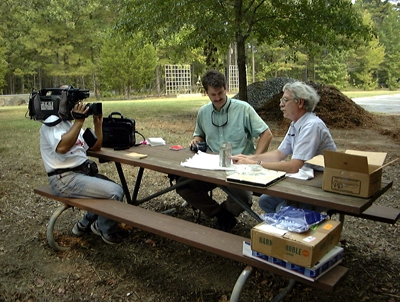
From time to time over the following decades, he tried other occupations. However, he truly enjoyed farming and always returned to it.
In June 1986 he suffered a massive, crippling stroke. It ended his ability to farm as well as his ability to communicate, unable to speak or to write. The sharpness of his mind had not been affected and he would use his good arm and head movements to direct family and friends, as they drove, on tours of farms and farm communities all across eastern Nebraska. Generally they could not know what thoughts and memories he experienced, but his reminiscences were a little more obvious when the object of the trip was one of the five old Army Air Fields that had operated in the region.
Francis E. Strotman’s son Tony did not hear many stories of his father’s service during the war. And Tony’s father was quite reserved, definitely not talkative related to his combat experiences, although he frequently talked of the friendliness of the Chinese people and of their aid to downed flyers. Tony remembers clearly always being cautioned by all the women in the family, "Don't ask about the war! He doesn't want to talk about it."
Thinking back on it today, Tony reflects, "I wonder if, as I reached maturity and the years had passed, if he would have opened up had I shown an interest". But for various reasons that never happened.
Then, several years after his father had suffered the debilitating stroke, Tony decided to learn more. "His grandsons had reached maturity and there was a gap (1943-45) in family knowledge of his experiences. So, I began to search for some bit of information," says Tony.
It was tough work at that time, document-by-document, and person-by-person. Still, Tony was able to learn much from careful examination of historical records; yet much more of what he has learned has come from men who served with his father in China. That was only the beginning of a long journey of learning and labor for Tony, and "all else sprang from that."
And a lot would end up springing from that indeed, with Tony really becoming a late-in-life historian in his own right, and even co-authoring a book on the 490th Bombardment Squadron ("The Burma Bridge Busters", Howard Bell, Anthony Strotman, 2005). Tony has also been a tremendous supporter of the Remembering Shared Honor project, and it is no exaggeration to say that the project would not necessarily being going forward today without Tony’s support, especially in the beginning.
T/Sgt Francis E. Strotman (born 23 Feb 1918, died 10 Feb 1994)
Engineer- Gunner
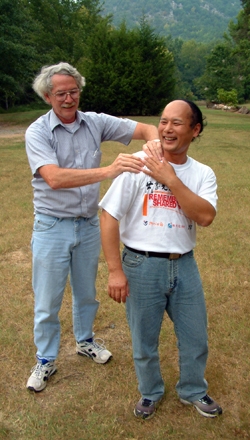
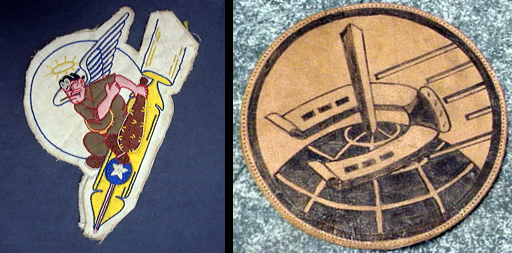
September, 1942 until about January, 1944, and the "Ringers" patch (right) used later, when Francis Strotman flew.
[1] Flight Officer: a rank for men with the ability to perform pilot, navigator, or bombardier duties, but with no college experience.
